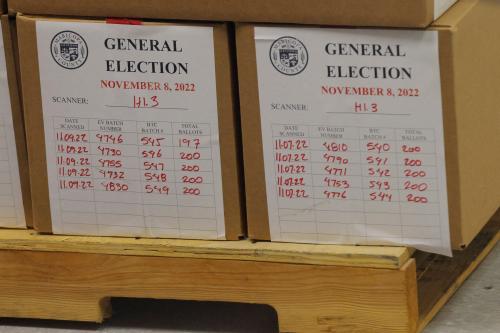The death of Nigerian President Umaru Musa Yar’Adua did not come as a shock to most Nigerians due to his prolonged illness. In memory of his brief presidency, Yar’Adua will be remembered most for his unyielding commitment to the rule of law and his personal transparency as a politician. These attributes are rare among the Nigerian political elite. As president-elect, he declared his financial assets and invited Nigerians to judge his pledge of transparency at the end of his elected term when he would once again declare his assets. His attempt to find a lasting solution to the crisis in the oil-producing Niger-Delta region produced an amnesty program that required militants to lay down their guns and embrace peace and development in their communities. After admitting flaws in the election that brought him the presidency, Yar’Adua immediately initiated an overhaul of the electoral process to ensure that Nigeria could conduct credible elections in the future. He removed the selectivity stain that previously clouded anti-corruption efforts. In a departure from his predecessor, Yar’Adua institutionalized efforts to fight corruption rather than build the efforts around an individual, although his efforts against corruption were overshadowed by noise from within and outside the country.
During his inaugural speech, the new Nigerian president, Dr. Goodluck Jonathan, affirmed his commitment to Yar’Adua’s legacy in the areas of transparent governance, electoral reform, peace and development of the Niger Delta, security of life and property around the country, and the fight against corruption. Since the return of democratic governance to Nigeria in May 1999, elected presidents have tended to live up to their promises. A comparison of the last two presidents’ inaugural speeches and their subsequent achievements not only support this but also provides a basis for confidence in the new president.
Jonathan has learned important governing lessons from the various crises and challenges of democratic governance during his tenure as a deputy governor, then as governor of his home state before becoming vice president in May 2007. While these experiences are invaluable, it is also important that, as president, Jonathan seizes this opportunity to put Nigeria back on the path of rapid progress by devising fresh approaches to tackling the country’s growth and development problems.
Good Governance and Electoral Reforms
President Jonathan has taken some steps to demonstrate his commitment to good governance. He declared his financial assets back in 2007, and has included more people with either good knowledge of the country or proven managerial skills in his cabinet. While these were good steps, the problem of political patronage remains the bane of political and economic progress in Nigeria. Although the leadership crisis that gripped the country following the former president’s illness is partly attributable to weakness in the constitution regarding succession of power, it is to a greater extent a reflection of the strength of political patronage. Going forward, the president needs to establish new standards regarding who should do business with government and how government business should be run. Some of the steps taken by the Obama administration in the U.S. could provide guidance in this respect. On electoral reforms, he has taken some bold steps by removing the controversial chairman of the electoral commission. He should continue to engage the Judicial Council in the reforms and ensure that credible electoral officers are appointed, while ensuring the independence of the electoral commission. He also needs to ensure that the Economic and Financial Crime Commission (EFCC) becomes an institution that operates independently of the presidency subject to the rule of law.
Peace and Development of the Niger-Delta
The crisis in the Niger Delta has festered over more than two decades. The late president had already initiated an amnesty program to tackle the issue. Moving forward on this agenda requires a critical look at the historically important issues. Although the Movement for Emancipation of the Niger Delta (MEND) claimed that their struggle was borne out of total neglect of the Niger Delta areas, insiders would say that the crisis was more a result of the loss of confidence and trust by the youth in their political leaders. First, the federal government did not make good on its plan to compensate the indigenes for land appropriated for oil exploration. Second, monetary compensations by the oil companies to the communities through their leaders are often misappropriated. The youth reacted by attacking the homes and properties of community leaders. After cycles of infighting and having realized their approach was not fruitful, the youth changed their strategy and resorted to demanding compensation directly from the oil companies by taking hostages and demanding ransoms.
The Niger Delta Development Commission (NDDC), which was established about a decade ago to develop those areas, has made minimal impact primarily due to internal conflicts among its members. Members from different states and ethnic groups would prefer to appropriate most of the funds and projects for the benefit of their own respective areas. The absence of tangible impact by the commission remains a rallying point for militant youth to return to hostage-taking. As an indigene and former governor of a member state of the Niger Delta, the acting president needs to demonstrate that he has the knowledge, executive power and the political will to implement the terms of the amnesty program. Although he has recently appointed a new minister of the Niger Delta, there is a pressing need to restructure the NDDC in order to fasten the pace of development efforts. Jonathan could consider appointing a trusted Nigerian non-indigene of the Niger Delta area as chair of the governing board in order to break the current and potential stalemate in the commission’s decision process.
Security Issues around the Country
The crisis in Jos, Plateau State and similar crises in other parts of Nigeria provide lessons in the handling the country’s security matters. However, the lessons would be lost if the causes of these security crisis are not thoroughly examined. The Jos crisis began as an ethno-political one, but has recently assumed a dangerous religious dimension. The crisis started in 1996 during election for chairmanship of the Jos North local government. The new council was created by the Ibrahim Babangida administration in 1994 and governed by an appointed chairman for the first two years during which there were no crises. The area is populated by indigenous people and immigrant settlers. Since the settlers have outnumbered the indigenes over the years, the council election was won by a representative of the immigrant Hausa ethnic group, the majority population group in the council area. The outcome was not acceptable to the indigenes who felt entitled to the office. Since then, the battle for control of the local government has generated unrest on a recurring basis. The crisis assumed a religious dimension since the immigrant Hausas are Muslims and the indigenes are predominantly Christians. Other ethnic groups have become victims of the intermittent crisis either accidentally or by taking sides with the two groups based on religious affiliations.
Fundamentally, the Jos crisis can easily be replicated in other parts of the country as long as there are grounds for rivalry for resource control, particularly along ethnic lines. The main lesson learned is that governance by appointed administrators who are typically from outside the council area has worked better for peace and development. While this is at odds with the principles of democratic governance, the model provides clues as to how to solve the crisis. The government has always dealt with this and other crises on a post-mortem basis by setting up committees of inquiry. It is time to switch from the committee-of-inquiry approach to investing in more proactive domestic intelligence gathering system. Every crisis-in-waiting can be averted with little additional investment in the intelligence apparatus. Nigeria has the manpower to achieve this goal; there are people with deep knowledge of the history of every potential trouble area that would be happy to be part of the process.
Sound and Long-Term Public Institutions
The major problems confronting development in Nigeria are rooted in socio-cultural composition. The society consists of distinct and numerous communal groups, extended families and lineages, clans and ethnic groups, which have served to sustain livelihoods during years of bad governance, unemployment, deprivation and financial insecurity. As a result, these groups have transformed into solidarity groups, the welfare of which has assumed greater importance than the welfare of the larger society. This explains why female relatives of a Nigerian politician ordered to be arrested for corruption are willing to strip naked in protest. A Nigerian politician who holds public office is expected to use the country’s resources first and foremost for the benefit of his or her cultural, familial, ethnic or religious group. Instead of hard work on the farm or other productive enterprises, politics and political patronage have turned out as the most productive private investments and the platform for achieving the “Nigerian” dream.
For Nigeria to move forward in a sustainable way, it is imperative to strengthen public institutions, including law enforcement and social security institutions. The parliament needs to take seriously the issue of retirement benefits for politicians in every part of the county. There is urgent need for viable debate on how to eliminate the “fear of the unknown” that is the leading driver of corruption. If necessary, new institutions should be creatively designed with two objectives in mind. First, they must have the potential to weaken group solidarity. Second, they should provide Nigerian citizens some sense of ownership of the larger society in the country. It is also time to start investing in the collection of rich data that can provide the necessary information for development planning and robust policy analysis. The current depth of data collection efforts is anything but commendable.
The 2011 Presidential Election
President Goodluck Jonathan should not make participation in the 2011 presidential election a do-or-die affair. He should rather focus on building on the legacy of his late friend and predecessor Umaru Musa Yar’Adua. He has the support of various interest groups and citizens from across the country behind him. He should seize the moment and pursue the goals he promised in order move the country onto a path of sustainable development. If Jonathan decides to run in the 2011 presidential election and wins, it would be good news for the country since it guarantees continuity in his programs and policies. If instead he decides to just complete the tenure of the Yar’Adua administration, then he can focus more energy into his plans and supervise a credible election later this year. Either way, it is a win-win situation for the country.



Commentary
Op-edChallenges and Possibilities for Progress in Nigeria
May 17, 2010